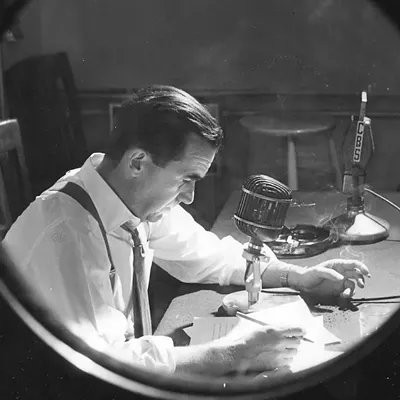"The gigantic smear of suburbia that runs almost without interruption from north Boston through Connecticut, New York, New Jersey, Baltimore, Washington and northern Virginia is not going to be a happy place," writes Kunstler in his new book, The Long Emergency. Kunstler will share his predictions and discuss possible solutions at a series of events this week in Spokane.
Kunstler's been a commentator on America's road to meaningless (Home From Nowhere) where we have decimated our cities and our culture through The Geography of Nowhere -- also known as suburbia. For Kunstler in this most recent book, the lynchpin is oil -- cheap and abundant oil. Some see oil's half-life, or peak, having already hit us around 2001. Some purport it will hit peak next year, the latest by 2010. For Kunstler, the time frame argument is useless.
"The blandishments of cheap oil and gas were so seductive, and induced such transports of mesmerizing contentment, that we ceased paying attention to the essential nature of these miraculous gifts from the earth: that they exist in finite, nonrenewable supplies, unevenly distributed around the world," Kunstler writes.
It's not a pretty picture: "The cheap oil age created an artificial bubble of plenitude for a period not much longer than a human lifetime, a hundred years... So, I hazard to assert that as oil ceases to be cheap and the world reserves arc toward depletion, we will indeed suddenly be left with an enormous surplus population -- with apologies to both Charles Dickens and Jonathan Swift -- that the ecology of earth will not support."
Despite the dire predictions, in the end the reader must look to The Long Emergency as a call to action. Kunstler's lesson is simple - we should have stayed local, should have lived within our means, should have stayed connected to our communities, should have distributed wealth and lived sustainably.
I asked Kunstler about the emergency he warns about.
PH: You mention the Jiminy Cricket syndrome -- what we wish for will come true, as in the wish-upon-a-star miracle of new energy to replace oil -- as a reason Americans cannot accept the fact that the American way of life will change dramatically when energy becomes expensive, scarce and dirty. And then you bring up "consensus trance" as the zombie approach to dealing with the ill effects of wastefulness in this society. What are the major factors behind these syndromes?
JHK: Well, I've collected some metaphors to try to explain the public's resistance to a coherent national discussion of our energy predicament. It boils down to wishful thinking, lack of precedent for the problem and the peculiarities of human group dynamics. To haul in yet another somewhat moth-eaten metaphor, we have a broken consensus. Add to this the fact that so many Americans are personally invested in the suburban sprawl economy -- both in their jobs and their personal property -- that they cannot conceive of changing their behavior (for instance, not being able to drive cheaply wherever they want to go). Personally, I think this state of paralysis will persist until there is significant crisis. It is possible that the aftermath of Hurricane Katrina will be that crisis. Gas pump prices are shooting way up, and there will be possibly graver problems with home heating based on natural gas, most of which comes out of the Gulf of Mexico and enters the pipeline network at New Orleans.
PH: Americans are bred into individualism and private property rights. How can we crack that operating model and precipitate a change?
JHK: There is some collective action that would help us tremendously, and it is exactly what we are not doing -- for instance, repairing the nation's passenger railroad system. Nothing could have a more beneficial impact on our excessive oil consumption. I haven't heard a single Democratic senator come out for that (I'm a registered Democrat). I think we are in for a great deal of turbulence, not collective action. If there is any of the latter, I imagine it will happen locally. It seems to me the federal government utterly lacks the vision and the will to act.
PH: Mention a few significant developments in the world since you wrote the manuscript that shine an even brighter spotlight on your thesis in The Long Emergency.
JHK: Hurricane Katrina illustrated the synergies that are occurring as we enter the zone of the long emergency. The catastrophic strength of the hurricane was probably a result of higher surface temperatures this year in the Atlantic and Gulf of Mexico -- in other words, global warming. The hurricane will lead directly to huge oil and gas market interruptions, and to severe problems for the U.S. economy. Also, obviously, this happened when the oil and gas markets had already entered a period of volatility.
PH: What do you see as the fallout of Hurricane Katrina (and of those many more to come) in the arena of serious talk about elements of your book?
JHK: I don't know that New Orleans will ever recover from Hurricane Katrina. It's perhaps too early to tell, but it appears that most of the city's building stock is toast. It will probably remain uninhabitable for months, at least. I imagine that some oil-and-gas terminals will be distributed around the Gulf differently in the future. But the oil and gas business is on the whole a contracting industry, and I doubt that they will make huge investments -- such as rebuilding refineries elsewhere. I think a lot of these things will become self-evident soon.
PH: What do you tell 18-year-olds that they should be doing to prepare themselves for the future?
JHK: I tell kids to think about a hands-on vocation and to ask themselves whether the place they live has prospects to support life under quite different conditions than they see around themselves today.














